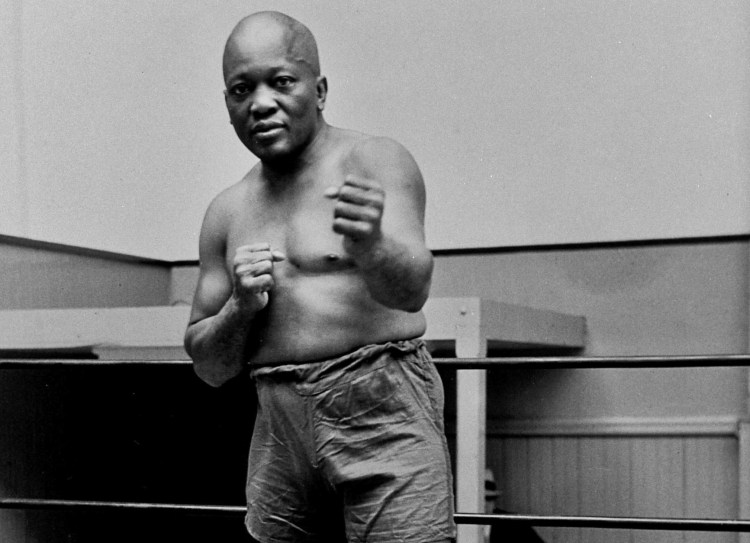President Trump granted a posthumous pardon to boxer Jack Johnson on Thursday, wiping clean his 1913 Mann Act conviction. Johnson, the first black heavyweight champion, was convicted under federal legislation that made it illegal to cross state lines with a woman “for the purpose of prostitution or debauchery, or for any other immoral purpose.” Jim Crow-era prosecutors often used the legislation as an anti-miscegenation device.
“A truly great fighter,” Trump said Thursday in the Oval Office, where he signed the pardon in a ceremony attended by boxing legend Lennox Lewis and actor Sylvester Stallone, among others. “He had a tough life.”
Trump noted that a pardon for Johnson, whom he called “one of the greatest that ever lived,” had considerable support in Congress, including within the Congressional Black Caucus. The president said Johnson served prison time “for what many view as a racially motivated injustice.”
Trump tweeted last month that he would consider pardoning Johnson after receiving a call from Stallone, who, according to the president, had explained the fighter’s “complex and controversial” life.
Congressional leaders had long lobbied presidents to pardon Johnson; “No president ever signed it, surprisingly,” Trump said Thursday.
A bill requesting a Johnson pardon from George W. Bush passed the House of Representatives in 2008 but died in the Senate.
A 1,000-page education bill in 2015 included a provision requesting a pardon for Johnson. It called the boxer a “flamboyant, defiant, and controversial figure in the history of the United States who challenged racial biases.”
Sen. John McCain (R-Ariz.) and former senator Harry M. Reid (D-Nev.), along with Congressmen Peter T. King (R-N.Y.) and Gregory W. Meeks (D-N.Y.), later requested a pardon for Johnson from President Obama in 2016.
John Arthur “Jack” Johnson, nicknamed the “Galveston Giant” in the ring, was born in 1878 southeast of Houston. By 1903, he became the unofficial “Negro heavyweight champion.” World heavyweight champion Jim Jeffries refused to fight him and instead retired. But in 1910, Johnson gained the championship belt, and Jeffries emerged from retirement to “reclaim the heavyweight championship for the white race.”
“Jeff, it’s up to you,” novelist Jack London wrote before the bout, according to NPR. “The White Man must be rescued.”
Instead, Johnson pummeled Jeffries for 15 rounds in “the battle of the century” and won the belt outright.
“I could never have whipped Johnson at my best,” Jeffries later said. “I couldn’t have hit him. No, I couldn’t have reached him in 1,000 years.”
The Mann Act was signed just weeks prior, though, and federal investigators almost immediately began looking into Johnson’s romantic life.
He married a white woman, Etta Terry Duryea, in 1911, but their relationship was rocky and she committed suicide a year later. Three months after that, he married Lucille Cameron, who was also white. Her mother was so disgusted with the relationship, she claimed Cameron had been kidnapped, but Cameron refused to cooperate with investigators.
But law enforcement agents found Belle Schreiber, a Chicago prostitute with whom Johnson had an affair years earlier. She agreed to testify against the boxer in 1913, and an all-white jury took less than two hours to convict him. He skipped bail after the trial and traveled Europe and South America with Cameron before surrendering to American agents at the Mexican border in 1920.
Before his incarceration, Johnson was known to prance around the ring with swagger. He owned a nightclub and wore gold teeth. He once reportedly purchased a pet leopard and took it for walks while sipping champagne.
But by 1921, he was past his prime, and boxing instituted a stricter color barrier. It would be another 16 years until Joe Louis defeated James Braddock in Chicago to win the world heavyweight title.
Johnson fought, often for private audiences, until age 67 in 1945. He died a year later in a car wreck in North Carolina, speeding from a restaurant that refused him service.
Send questions/comments to the editors.



Success. Please wait for the page to reload. If the page does not reload within 5 seconds, please refresh the page.
Enter your email and password to access comments.
Hi, to comment on stories you must . This profile is in addition to your subscription and website login.
Already have a commenting profile? .
Invalid username/password.
Please check your email to confirm and complete your registration.
Only subscribers are eligible to post comments. Please subscribe or login first for digital access. Here’s why.
Use the form below to reset your password. When you've submitted your account email, we will send an email with a reset code.